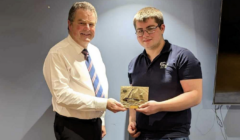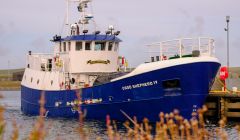Election / Plenty of use for those council reserves, candidates argue in election campaign
THE NEW council could be significantly more sympathetic towards spending some of the SIC’s reserves to support islanders suffering from the cost-of-living crisis, get a home insulation programme underway and also to kick-start investments in fixed links.
These are some of the trends emerging from responses by election candidates to questions by Shetland News. Twenty one of the 35 candidates had responded by the weekend deadline.
During the last council, Shetland Central member Ian Scott had been voted down on several occasions when he tried to raise the issue of using some of the reserves for purposes other than ‘bailing out’ the council’s own overspends.
The council continues to be deemed unsustainable due to the fact that it needs to draw money from its reserves – or investments – to balance the books. In the 2022/23 budget that draw amounts to more than £5 million.
But councillors are repeatedly warned that despite the investments often returning gains, the market is volatile and that continuing to dip into the reserves may have longer-term, cumulative consequences.
In what could be interpreted as a mini revolt against the now retired SIC leadership and indicating a shift in positions among sitting elected members, councillors voted against finance officers’ recommendations to freeze council tax and house rents at one of their last meetings in February.
The move will cost the SIC around half a million pounds of lost income.
Scott, who is standing again in the Central ward, said: “With all the talk of finance and savings – cuts to most people – again never once did we sit down and discuss spending. We were told [by the council leadership] that we couldn’t spend, and that was it.”
This may well change following the 5 May election with several of the candidates voicing their support to use some of the reserves on targeted projects such as seed funding for fixed links and home insulation.
Become a member of Shetland News
There also appears to be appetite among many candidates for involving Shetland Charitable Trust, which is independent of the council, to play a role in cushioning the impacts of further steep rises in the cost of living.
Fellow Shetland Central candidate Moraig Lyall said: “I am open to using a proportion of our reserves as capital to kick start some of these projects (fixed links, replacement ferries where necessary, building of energy efficient homes and public buildings and upgrading of older properties) but only where other sources of funding are not available and not to the extent that the remaining reserves would be unable to continue to support our vital services.”
The SIC sits on combined investments of around one billion pounds, made up of reserves as well as the council’s pension fund. In addition, the charitable trust’s investments are valued at around £500 million.
Shetland West election candidate Zara Pennington, standing for the SNP, said: “I support a limited use of funds to improve the energy efficiency of our schools and care centres and to transition their heating systems to renewable energy.
“I would support the Shetland Community Benefit Fund in providing extra support for insulating some of our most outdated housing stock once energy is flowing from the Viking wind farm.”
In contrast, her party colleague Robbie McGregor, who is standing in Shetland South, is adamant that there is no “fat” in the reserves “to fund additional programmes”.
“I will oppose the use of further drawdown from the reserves as we have a responsibility to ensure that the reserves are available to future generations of Shetlanders to fund the extra services we enjoy for many years to come,” he said.
However, many candidates feel the ‘rainy day’ often referred to has finally arrived, and the council should become an actor in ‘local government’ and use its economic muscle.
Shetland North candidate Tom Morton, already confirmed as a Labour councillor after the ward was uncontested, says the rainy day will likely turn into a “brutal storm’ come autumn, and suggests that the SIC will have to “draw on that lump of invested gold” to ensure that no-one goes hungry or suffers cold this coming winter.
He would also like to see pressure being put on the Shetland Charitable Trust to immediately reinstate the pensioner’s bonus; and also floats the idea of wind farm money held in the Shetland Community Benefit Fund being used for personal need and not just grant aiding community projects.
Lerwick North and Bressay candidate Stephen Leask argues that the council should be “investing in our communities” and is in favour of “some small use of reserves”, while Dennis Leask, standing in the Lerwick South ward, advocates “direct intervention”.
He would like to see the use of £3.25 million – some 0.65 per cent of council reserves – to distribute to the 20 per cent of poorest households in Shetland over a three-year period.
This would result in a £500 direct payment to 2,600 households in the first two years and £250 in the third year “to alleviate hardship for a limited period”.
Others, such as the Greens who have put forward three candidates, argue that to make fixed links sooner rather than later “realistically some of the finance would need to be provided locally in Shetland”.
Its Shetland South candidate Alex Armitage said: “We would like to see some of Shetland’s contribution to fixed links provided as a loan from the reserve fund.
“The initial capital investment to build the tunnels would come upfront.
“Once the tunnels are constructed, repayments could be made using the money the SIC would have spent on ferries, plus a possible tunnel toll which could be in place during the period of repayment.”
Meanwhile, Lerwick North and Bressay candidate Gary Robinson – a former leader of the council – would like to take a different route.
Shetland should adopt the Scandinavian model and set up a single-purpose company to build and operate tunnels, he proposes.
“Tolls would be paid to use the fixed links until such time as they’re paid off – usually around 25 years or so,” Robinson added.
“If the Scottish Government could be persuaded to keep their revenue funding for the ferries in play after the new links open, the this would help to keep the cost of the toll down.”
Become a member of Shetland News
Shetland News is asking its many readers to consider paying for membership to get additional features and services: -
- Remove non-local ads;
- Bookmark posts to read later;
- Exclusive curated weekly newsletter;
- Hide membership messages;
- Comments open for discussion.
If you appreciate what we do and feel strongly about impartial local journalism, then please become a member of Shetland News by either making a single payment, or setting up a monthly, quarterly or yearly subscription.














































































